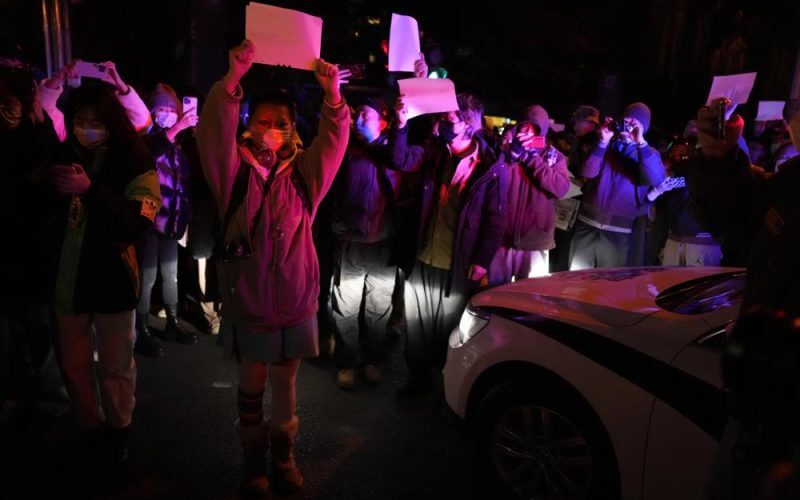1. Sanction the CCP and Security Forces
With students at several universities in China facing arrest by police for protesting the extreme COVID lockdown policies and lack of freedoms in China, the U.S. and its allies can enact sanctions against the officials of the Chinese Communist Party's (CCP) security forces and members of the government. Such measures would prevent members of the CCP, and individuals affiliated with the regime, from accessing overseas financial assets and being unable to travel freely. The international community could also target university officials in China reporting protesters to the police, preventing them from traveling outside Beijing and seizing any financial assets abroad. It would also put the communist government on notice, a reminder that the international community stands with the people of China who are protesting for their freedoms and human rights.
2. Media and Internet Access
With protesters in China posting marches, chants, and reactions by the police on social media, the international community can help protesters access foreign media and have Internet access to post their stories. With police cracking down on protesters, many fear the regime could enact an Internet shutdown and foreign press censorship akin to the Islamic Republic of Iran and Russia. Should such actions occur, the international community should demand that China allow local journalists to report on the streets of Beijing, Shanghai, and other areas where protests are currently ongoing. Additionally, tech CEOs like Elon Musk and others who activated satellites in countries like Iran and Ukraine could extend their technology to the people of China who are protesting for their freedoms.
3. Loss of UN Seat
If the international community is serious about standing up to the Chinese Communist Government and standing with the protesters in Beijing and elsewhere, the United Nations can revoke China's seat. Currently, China sits on the UN Security Council along with the U.S. the United Kingdom, France, Russia, and other members. If an overwhelming majority of members vote to kick China off the Security Council, they should also kick them out of the UN entirely. The UN could also go a step further and rally countries to condemn the crackdowns by the communist police forces and prevent organizations like the International Monetary Fund (IMF) and international trade organizations from engaging with the CCP. The loss of China's position in these global institutions would isolate the regime and encourage protesters to march against the government's strict COVID lockdowns and for their freedom.
4. Cyberattacks Against the CCP's Surveillance
Since the creation of the People's Republic of China (PRC), the communist government has engaged in surveillance against its citizenry, monitoring individuals inside and outside the country. With protests occurring throughout different cities and universities, the government has relied on its surveillance capabilities to target protesters and arrest them. If countries like the U.S. and its allies were to engage in cyberattacks against China's surveillance system, it would prevent the regime from being able to target peaceful protesters and encourage more gatherings against the dictatorial COVID lockdown policies. A cyberattack against China's surveillance system would show the protesters that countries like the U.S. and other nations care about the ongoing situation in Beijing and will do everything to prevent the government from monitoring dissidents and deliberately targeting them.
5. Recall Chinese Officials, Embassies, and Other Influences
With the international community banning members of the Russian and Iranian governments and closing both regimes' embassies, the international community could engage in similar actions against Chinese officials and their embassies abroad. Committing to such measures would isolate the communist government and send a message that the world is serious about the human rights abuses in Beijing and encourage more individuals in China to join with students at universities and individuals protesting the government. Additionally, universities in America and other parts of the world could help by banning Confucius Institute programs, which are known to have strong ties with the communist government. Governments should also prevent companies with links to the communist regime, like TikTok on the app store, while also preventing companies like Apple capitulating to China by limiting protesters in China from accessing Airdrop.










